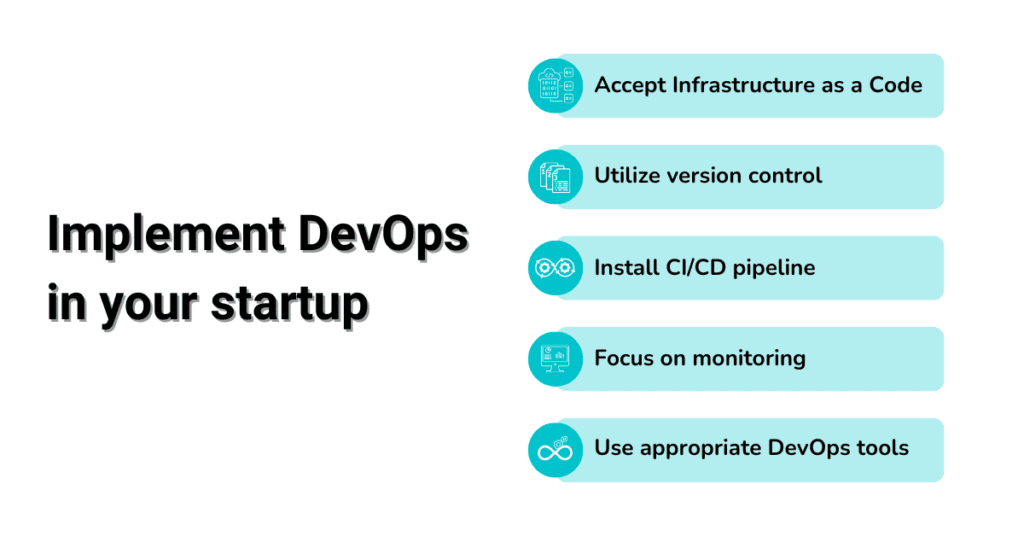The journey of startups is very interesting. At one point, you may be filled with multiple ideas, and at another point there may be roadblocks.
Consider the development process, for example. You may be willing to see your app taking the market by storm, but then deployment gets slow due to disruptions you may have not planned for.
If your team faces communication issues, then surely the project deadlines gets pushed further, which ultimately impacts the product launch time. Moreover, the initial excitement in your customer’s eyes gets dimmed down.
Slow deployments, hence, usually becomes one of the prime reasons why startups fail to achieve the desired take off. This hinders their innovation process and makes it hard to be agile.
But there’s a solution that startups are now rapidly adopting to- DevOps.
DevOps connects your development and operations teams to promote effective collaboration, lessen the communication barriers and pave the way for fast deployments.
With DevOps, your startup avoids the slow lane and takes the innovation pathway.

How DevOps ignites your startup
DevOps is a powerful solution that boosts your development process in many ways. Here’s how DevOps can benefit your journey as well:
Faster deployments: Tedious deployments can now happen in a very less time with CI/CD pipelines used by DevOps to automate testing and code deployment. This makes room for fast releases, allowing you to get new features and updates to your users in a rapid way.
Enhanced quality: DevOps isn’t just about speed; it’s about quality too. By integrating automated testing throughout the development lifecycle, DevOps helps you identify and fix bugs at an early state, before they reach your customers, thereby keeping your customers satisfied.
Adopted agility: As the market changes, so do the requirements of your customers. But the story becomes different when you adapt to DevOps and integrate the process in your startup. With faster deployments and continuous improvement, you can very easily reconstruct your product as per the customers’ feedback and demands. This complete cycle makes you agile, which makes you ready for any changes.
Enhanced Communications: As the market changes, so do the requirements of your customers. But the story becomes different when you adapt to DevOps and integrate the process in your startup. With faster deployments and continuous improvement, you can very easily reconstruct your product as per the customers’ feedback and demands. This complete cycle makes you agile, which makes you ready for any changes.
Cost efficiency: Due to low collaboration, the teams may end up spending more time on fixing bugs, redeploying the code, or making new changes which may lead to the loss of cost and resources. Having a DevOps integration practically helps in mitigating these delays and reworks which can help in saving a lot. Moreover, adopting automation reduces manual effort and minimizes human errors which frees up your team to focus on priority tasks.
To gain significant benefit from the advantages offered by DevOps, you need to start building practical strategies within your startup.
This builds a dedicated toolkit and practices for your team that helps in driving innovation and growth for long term efficiency.
How to implement DevOps in your startup
Simply adopting DevOps is not enough. To yield actual results as per your set KPIs, you need to take some relevant steps to implement these practices effectively.
Accept infrastructure as code (IaC): IaC gives you the ability to use configuration files to define and manage your infrastructure, including servers, networks, and other devices. Ansible and Terraform are two well-liked IaC tools. Infrastructure provisioning and setup are automated, which speeds up deployments, increases consistency, and lowers the risk of human error. Scaling your infrastructure as your startup expands is also made easier with IaC.
Utilize version control: Throughout your development process, version control technologies such as Git keep track of code modifications. This strengthens the resilience of your startup by making it simple to roll back to earlier versions. In addition, it keeps track of all the modifications made and guarantees that everyone in your team is working on the most recent version of the relevant code.
Install CI/CD pipelines: They automate the lifetime of software development. Every push to the code repository triggers an automatic integration, testing, and deployment of the updated code. Popular choices include tools like CircleCI or Jenkins. They allow for frequent, dependable deployments with little need for human interaction. This facilitates rapid iterations of products in response to customer requests and feedback loops.
Focus on monitoring and observability: While monitoring keeps tabs on the functionality and health of the system, observability digs deeper to help you identify the underlying causes of problems. Commonly used tools include Grafana and Prometheus. Real-time insights into the health of your application can be obtained through effective monitoring and observability. This makes it possible to proactively identify and address such issues before they negatively affect users.
Selecting the appropriate DevOps Tools: Choosing the appropriate DevOps tools is essential to the success of your startup. Consider these elements:
– Team structure and size: Select tools that complement the technical know-how and experience of your team. Ansible for lac has a syntax similar to Python, so if your team is proficient with Python, you might want to give it a try.
-Project specifications: Determine your unique requirements, such as cloud Integration or support for containerization, then choose technologies that meet those demands. Think about utilizing a CI/CD platform like Jenkins for microservices, as it provides strong containerization support.
– Scalability: Make sure the tools you select can grow with your startup as it expands. Find solutions that let you simply extend your infrastructure as needed by integrating with cloud platforms such as AWS or Azure,
– Open-source vs enterprise: Git for version control and Terraform for lac are two examples of open-source solutions to start with. You may assess corporate products with cutting-edge features and committed support as your needs change.

Conclusion
Aspiring startups like yours need to have strategic advantage. With DevOps, you may achieve success by using it as a powerful springboard for agility and innovation.
Delivering great products at a faster rate is made possible by DevOps streamlined processes and collaborative atmosphere.
This offers you a major competitive advantage that makes long-term growth possible.

